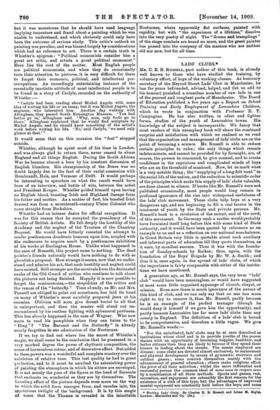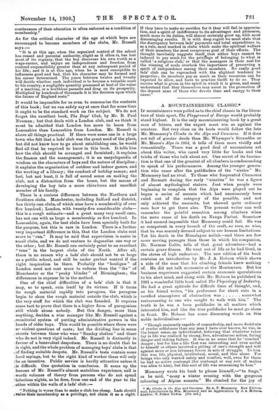LADS' CLUBS.• Ma. C. E. B. RUSSELL, part author of
this book, is already well known to those who have studied the training, by voluntary effort, of boys of the working classes. As honorary secretary of the Heyrod Street Lads' Club in Manchester, he has for years befriended, advised, helped, and (let us add to
his honour) punished a countless number of raw lads in one of the poorest and roughest parts of Manchester. The Board of Education published a few years ago a Report on School Training and Early Employment of Lancashire Children, which he wrote in conjunction with Professor E. T.
Campagnac. He has also written, in other and lighter forms, studies of the youth of Lancashire towns. His knowledge of the subject is incomparable. We fancy that most readers of this exemplary book will share the combined surprise and satisfaction with which we realised as we read that the organisation and management of lads' clubs are on the point of becoming a science. Mr. Russell is able to reduce certain principles to rules ; the only things which remain indeterminate, and cannot be provided for by foresight, are, of course, the powers to command, to give counsel, and to create confidence in the capricious and complicated minds of boys who are on the threshold of manhood. Now, let us mark what is a very notable thing ; the " supplying of a long-felt want " in the social life of the nation, and the reduction to scientific order of the principles which make this supply of lads' clubs valuable, are done almost in silence. If hooks like Mr. Russell's were not published occasionally, most people would long remain in profound ignorance of the rise into widespread usefulness of the lads' club movement. These clubs help boys at a very
dangerous age, and are beginning to fill a real lacuna in the treatment of youth by the State and private persons. Mr.
Russell's book is a revelation of the extent, and of the need, of this movement. In Germany such a matter would probably have furnished itself long before this with some kind of State authority, and it would have been quoted by reformers as an example to us and as a reflection on our national nonchalance.
In Great Britain very little is quotable about such auxiliary and informal parts of education till they quote themselves, as it were, by manifest success. Thus it was with the founda- tion of Sunday-schools by Raikes; thus, again, with the foundation of the Boys' Brigade by Mr. W. A. Smith ; and thus it is, once again, in the spread of lads' clubs, of which the importance is fairly comparable with either of the institu- tions we have mentioned.
A generation ago, as Mr. Russell says, the very term "lads' club" would have been meaningless, or would have suggested at most some little organised appanage of church, chapel, or mission. Even now there is much ignorance of the nature of this kind of club, and we can only say that no one has more right to try to remove it, than Mr. Russell, partly because he is an example of the perfect manager (though he would deriy it himself if we gave him the opportunity), and partly because Lancashire has far more lads' clubs than any county in England. The definition of a lads' club is bound to be comprehensive, and therefore a little vague. We give Mr. Russell's words :-
"For the uninitiated, lads' clubs may bo at once described as institutions whose chief end is to provide youths of the poorer classes with an opportunity of becoming happier, healthier, and better citizens than they are likely to become if they spend their leisure in loafing about the streets. The means employed are diverse: some clubs are devoted almost exclusively to amusement and physical development by means of gymnastic exercises and outdoor games ; some concern themselves mainly with the advancement of general education ; others make religious effort the pivot of all their activities ; whilst the more influential and -successful pursue the common ideal of »tens sana in corpore sand by a combination of all three methods. Sports and games, rest, recreation, and enjoyment are ostensibly the first reasons for the existence of a club of this type, but the advantages of improved mental equipment are constantly held before the boys, and some * Working Lads' • Clubs. -By Charles E. B. Russell and Lilian M. Rigby.,
London : Macmillan and Co. [n..1 - - continuance of their education is often enforced as a condition of membership."
As for the critical character of the age at which boys are encouraged to become members of the clubs, Mr. Russell
says :—
"It is at this age, when the organised control of the school has ceased and parental authority, slight as it often is, has lost most of its cogency, that the boy discovers his own worth as a wage-earner, and enjoys an independence and freedom from realised responsibility greater than at any subsequent period of his life ; and it is at this age, when he is most susceptible to influences good and bad, that his character may be formed and his career determined. Tho years between twelve and twenty will decide whether each individual is to become a valuable asset to his country, a negligible quantity possessed at best of the value of a machine, or a worthless parasite and drag on its prosperity. Multiplied by hundreds of thousands it is the decision upon which the future of England rests."
It would be impossible for us even to summarise the contents of this book; but we can safely say at once that for some time
it ought to be the standard work on the subject. We do not forget the excellent book, The Boys' Club, by Mr. B. Paul Neuman ; but that deals with a London club, and we think it
must be admitted that London has more to learn from Lancashire than Lancashire from London. Mr. Russell is above all things practical. If there were some one in a large town who felt that a lads' club was the great need of the place,
but did not know how to go about establishing one, he would find all that he required to know in this book. It tells him how the club should be arranged and furnished ; it explains the finance and the management; it is an encyclopaedia of
wisdom on the characters of boys and the nature of discipline ; it explains the organisation of outdoor and indoor games, and the working of a library; the conduct of holiday camps; and last, but not least, it is full of sound sense on making the club, not a distraction from the home, but the means of developing the boy into a more chivalrous and unselfish member of his family.
There is a curious difference between the Northern and Southern clubs. Manchester, including Salford and district, has thirty-one clubs, of which nine have a membership of over five hundred ; London, with twenty-five considerable clubs— this is.a rough estimate—and a great many very small ones, has not one with as large a membership as five hundred. In Lancashire, again, the best clubs have been specially built for the purpose, but this is rare in London. There is a further very important difference in this, that the London clubs cost more to "run." It may be said that supervision is easier in small clubs, and we do not venture to dogmatise one way or the other ; but Mr. Russell can certainly point to an excellent " tone " in the largest clubs of the North. After all, there is no reason why a lads' club should not be as large as a public school, and still be under perfect control if the right inspiration be there. Probably the "hooligan " of
London need not cost more to redeem than the " ike" of Manchester or the "peaky blinder" of Birmingham; the differences in expense lie in the method.
One of the chief difficulties of a lads' club is that it may, so to speak, ruin itself by its virtues. If it turns its rough material rapidly into paragons, the paragons begin to shun the rough material outside the club, which is the very stuff for which the club was founded. It requires • some tact to prove that there is a higher form of paragonism still which shuns nobody. But this danger, more than . anything, decides a wise manager like Mr. Russell against a
,.monitorial system of putting administrative powers in the :bands of older boys. This would be possible where there were -n-.violent questions of caste ; but the dividing line in mean streets between those who wear " Sunday clothes" and those -who do not is very rigid indeed. Mr. Russell is distinctly in - favour of a benevolent despotism. There is no doubt that he is right, and the whole problem of managing boys' clubs is that of finding suitable despots. Mr. Russell's tests contain some :hard sayings, but to the right. kind of worker these will only be an incentive.. Public service is hardly attractive unless it ,.is difficult. One quotation in conclusion. It sums up the
. lessons of Mr. Russell's almost matchless experience, and is • worth volumes of theory from persons who do not spend laborious nights, as he does, from one end of the year to the other within the walls of a lads' club :—
"Nothing is.worse than to make a club.too cheap. Lads should ,c value their membership as a privilege, not claim it as a right. If they have to make no sacrifice for it they will fail in apprecia- tion, and a spirit of indifference to its advantages and pleasures, much more to its duties, will almost certainly grow up, with most discouraging results. It is with deep regret we must state that the discrepancy between lads' payments and total expenditure is, as a rule, most marked in clubs which make the spiritual welfare of their members the most conspicuous goal of their efforts.. The thought inevitably suggests itself that either boys cannot be induced to pay much for the priviTege of belonging to what is called 'a religious club,' or that the managers in their zeal for the winning of souls overlook the importance of preserving a spirit of independence among their members. No really good lads' club can be reproached with the slightest tendency to pauperise; its members pay as much as their resources can be expected to allow, and have to practise thrift to do so. They receive what is given in the spirit in which it is given, and many understand that they themselves may assist in the promotion of the dearest aims of those who devote time and energy to their cause."











































 Previous page
Previous page